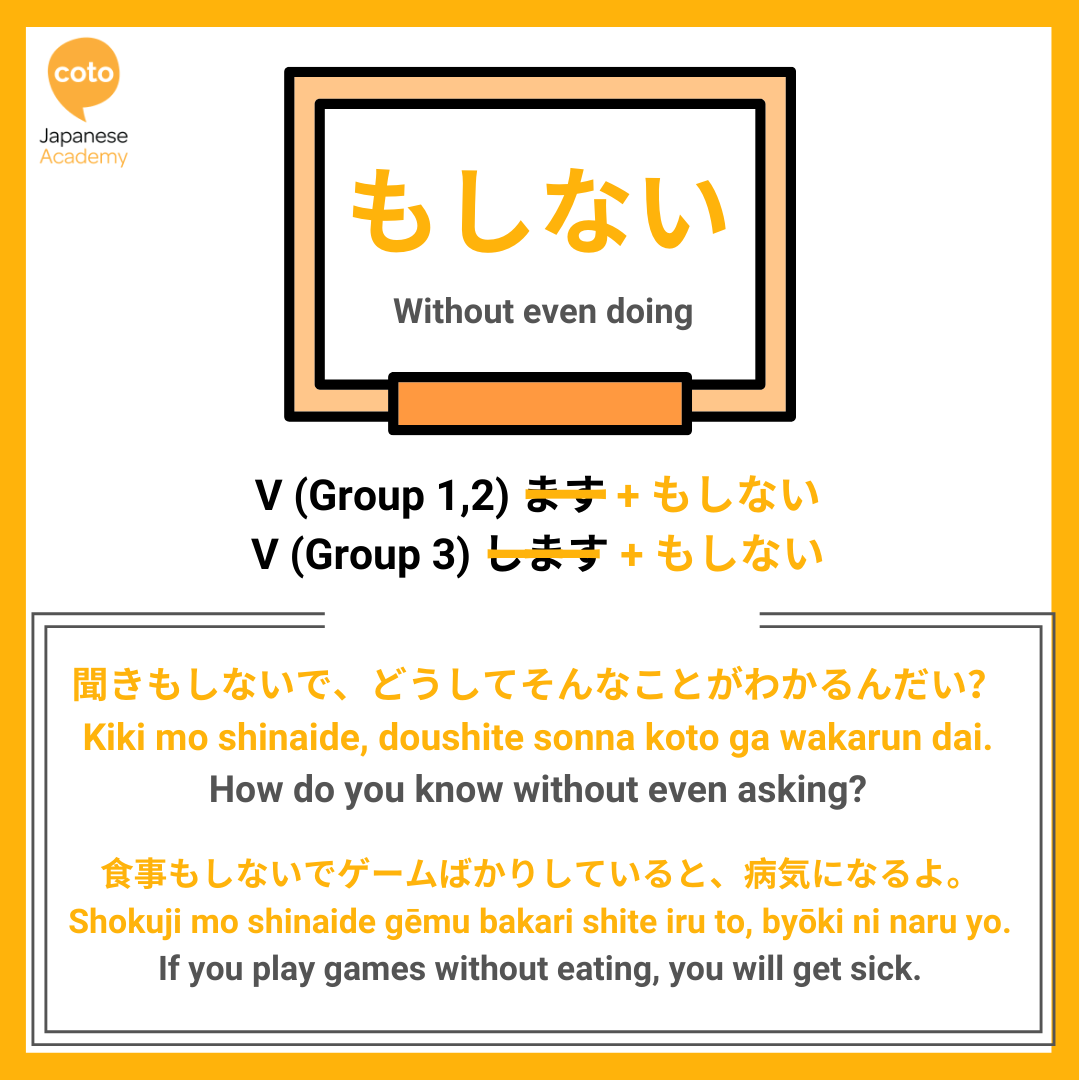Enjoyed our previous blog on 20 JLPT N2 Grammars?
In this blog, we share with you 20 MORE that will help you with your JLPT N2 revision! Without further ado, let’s dive in.
Here is the list of the 20 JLPT N2 grammar points:
- からすると
- といえば
- にもかかわらず
- もしない
- をめずって
- っこない
- というものは
- はさておき
- はもとより
- 以上
- 折に
- からして
- 次第
- ずにはいられない
- 限り
- ないものか
- に先立って
- はともかく
- あまり
- 得ない

Grammar Point 1: からすると Karasuruto
This grammar point is used to infer something based on another. It can be used with nouns only.

Grammar Point 2: といえば Toieba
This grammar point means ‘Speaking of…’ and is used when talking about a certain topic. It can be used with nouns.

Grammar Point 3: にもかかわらず Ni mo kakawarazu
This grammar point means ‘although’, ‘in spite of’, ‘nevertheless’ or ‘although. It can be used by combining with verbs, い-adjectives, な-adjectives, and nouns.

Grammar Point 4: もしない Moshinai
This grammar point means ‘without even doing’ something. It is used with verbs in Group 1, 2 and 3. Remember to remove the ます or します when combining with the verb!

Grammar Point 5: をめぐって O megutte
This grammar point means ‘concerning’ or ‘in regard to’, and is used when referring to something. It is used by combining with either nouns or verbs.

Grammar Point 6: っこない Kkonai
This grammar point means ‘no chance of’ or ‘impossible’. It is used with verbs with a ます-stem. Be sure to remove the ます when combining with the verb!

Grammar Point 7: というものは Toiumono wa
This grammar point is used to express the universal behavior on a certain topic. It is usually used to talk about a general idea or objective fact. It can be used by combining with nouns.

Grammar Point 8: はさておき Wa sateoki
This grammar point is used to ‘set aside’ something. It can be used by combining with nouns.

Grammar Point 9: はもとより Wa motoyori
This grammar point means ‘let alone’ or ‘also’. It can be used by placing it in between 2 nouns.

Grammar Point 10: 以上 Ijou
This grammar point means ‘because’ or ‘now that’. It is used by combining either with a verb or noun. When added to a noun, be sure to include である before 以上, so it becomes (Noun)である以上.

Grammar Point 11: 折に Orini
This grammar point means ‘when’ or ‘at the time’. It can be used by combining with casual verbs or nouns.

Grammar Point 12: からして Karashite
This grammar point expresses when you are inferring something ‘judging from’ or ‘based on’ something. It can be used by combining with nouns.

Grammar Point 13: 次第 Shidai
This grammar point means ‘as soon as possible’ and can be combined with verbs with a ます-stem. Be sure to remove the ます at the back!

Grammar Point 14: ずにはいられない Zuni wa irarenai
This grammar point means ‘can’t help but’. It is used by combining with verbs with a ない-stem. When adding this grammar point to the verb, be sure to remove the ない at the back!

Grammar Point 15: 限り Kagiri
This grammar point means ‘as long as‘. It can be used by combining it with either a verb or a noun. When added to a noun, be sure to include である or でない before 限り, so it becomes (Noun)である/でない限り.

Grammar Point 16: ないものか Naimonoka
This grammar point means ‘Can’t we…?’ or ‘Can’t I…?’ and is a particle used in questions. It can be used by combining with verbs with a ない-stem.

Grammar Point 17: に先立って Ni sakidatte
This grammar point is used when you do something before another, or when something happens before another. It can be used by combining it with either nouns or verbs.

Grammar Point 18: はともかく Wa tomokaku
This grammar point means ‘whether or not’ or ‘nevermind’, and can be combined with nouns.

Grammar Point 19: あまり Amari
This grammar point means ‘so much… that’. It can be used by combining with either verbs or nouns. When added to a noun, be sure to include の after the noun, so it becomes (Noun)のあまり.

Grammar Point 20: 得ない Enai
This grammar point expresses something that is impossible to be done. It is used by combining with verbs with a ます-stem. Be sure to remove the ます at the back when adding this grammar point to the verb!